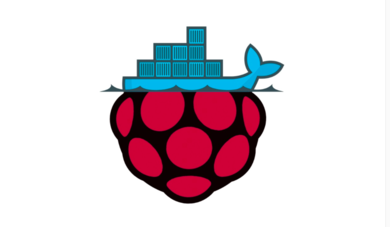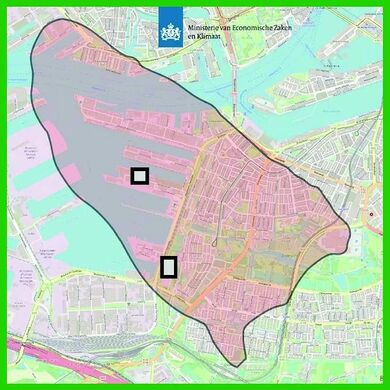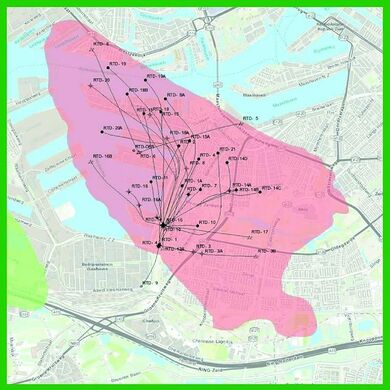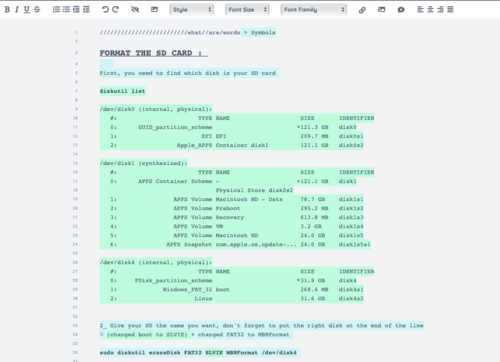User:Trashpuppy/TO: Difference between revisions
Trashpuppy (talk | contribs) |
Trashpuppy (talk | contribs) |
||
| Line 57: | Line 57: | ||
8. <b>Neimans, A. (2020). We Are All at Sea: Practice, Ethics, and Poetics of "Hydrocommons", RIBOCA2 - 2nd International Biennial of Contemporary Art 2020</b> | 8. <b>Neimans, A. (2020). We Are All at Sea: Practice, Ethics, and Poetics of "Hydrocommons", RIBOCA2 - 2nd International Biennial of Contemporary Art 2020</b> | ||
This text is a transcript of a lecture by Astrid Neimans in conversation with Sofia Lemos at the International Biennial of Contemporary Art. In this text Neimans <I>"suggests a we that has a common history in our water beginnings, although we are not all equally afloat."</I> In other words, water both divides and connects us. Neimans ideas are articulated under the proposed framework of hydrocommons. This framework explores the philosophical, political and ecological implications of seeing ourselves through our emergence from the water and simultaneously as containers of this water - our bodies are made up of 70% water. This idea unravels the delineation between nature and culture, instead seeing humanity as part and parcel of a constant circulation of water spanning generations and epochs; deep-time. This idea bellies the human centric understanding of life: the was a before humans, a during humans and there will be an after humans. Gayatri Chakravorty Spivak's planetarity - water is both of us and beyond us. <br><br>Our bodies carry the water that has been around since the coming into existence of earth. This water, a witness of time, lines our bodies with ancestral pools of knowledge. This is what Niemans refers to as the <I>"always time of water ... there is no such thing as 'away'." Toni Morisson: "Everything is now. It is all now."</I><br><br>Because water is an archive, it also retains memories of difference connected to water. Here Neimans brings black feminist scholar Christina Sharpe to the fore. In Sharpe's work the water is clearly highlighted as an archive of the Middle Passage.<br><br>This text talks about a lot of the ideas that I have sought to write about in the more speculative or poetic tone of the water. Precisely for this reason the text is interesting. Re-reading it, I realised how much more valuable this text is than I maybe noticed on the first read. | This text is a transcript of a lecture by Astrid Neimans in conversation with Sofia Lemos at the International Biennial of Contemporary Art. In this text Neimans <I>"suggests a we that has a common history in our water beginnings, although we are not all equally afloat."</I> In other words, water both divides and connects us. Neimans ideas are articulated under the proposed framework of hydrocommons. This framework explores the philosophical, political and ecological implications of seeing ourselves through our emergence from the water and simultaneously as containers of this water - our bodies are made up of 70% water. This idea unravels the delineation between nature and culture, instead seeing humanity as part and parcel of a constant circulation of water spanning generations and epochs; deep-time. This idea bellies the human centric understanding of life: the was a before humans, a during humans and there will be an after humans. Gayatri Chakravorty Spivak's planetarity - water is both of us and beyond us. <br><br>Our bodies carry the water that has been around since the coming into existence of earth. This water, a witness of time, lines our bodies with ancestral pools of knowledge. This is what Niemans refers to as the <I>"always time of water ... there is no such thing as 'away'." Toni Morisson: "Everything is now. It is all now."</I><br><br>Because water is an archive, it also retains memories of difference connected to water. Here Neimans brings black feminist scholar Christina Sharpe to the fore. In Sharpe's work the water is clearly highlighted as an archive of the Middle Passage.<br><br>This text talks about a lot of the ideas that I have sought to write about in the more speculative or poetic tone of the water. Precisely for this reason the text is interesting. Clearly defining water as an archive - an invisible one - but not intangible, also connects to the idea of the palimpsest that I have been using to think through the city as a living phenomenon, talking of the past, present and future. Re-reading it, I realised how much more valuable this text is than I maybe noticed on the first read. | ||
==<p><p style="color:black; font-family: Alike Angular; font-size: 20pt; font-weight: bold;">Site-map</p>== | ==<p><p style="color:black; font-family: Alike Angular; font-size: 20pt; font-weight: bold;">Site-map</p>== | ||
Revision as of 16:32, 19 January 2022
Thesis Proposal
Working Title: Seaing History
This thesis will reflect and re-count the socio-economic development and colonial expansion of The Netherlands and the continued repercussion thereof through its relation to water. Braiding together two strands; one consisting of critical essays that take a geographical location in Rotterdam as its point of departure for wider discussions, the other takes the form of a speculative fiction from the perspective of the sea. (I am considering to add a 3rd strand consisting of more personal diary inputs, reflections on artworks / readings or interview transcripts).
The sea, at once ancient and new every day, local and global, shapeshifting and plural, is a witness. Used and abused as an infrastructure for trade, transport (of data), and territorial expansion. A source of creation and destruction.
By adopting the sea as the perspective of this thesis, I aim to talk about history by presenting a subjective non-linear reflection on history. The text will make aim to include a multiplicity of voices, through incorporating various sources and stories in a collagelike manner. The following section presents a proposed point of departure for the poetic enquiry informing each of the essays.
Introduction: Water Memory
1 Rotta: The Deluge and the Dutch origin Myth
2 Delfshaven: The Tide - The Moon and the Market
3 Europort & Maasvlakte: Liquid land
4 NorthC: Clouded vision
Bibliography
- Cole, T. (2012) The City as Palimpsest
- Coghlan, J.M. (2020). The Cambridge companion to literature and food. Chapter 11: Postcolonial Tastes. Cambridge Cambridge University Press.
- Fox, D. (2019). Limbo. Fitzcarraldo Editions.
- Geuze, A. & Koekebakker, O. (2005). The Flood : 2nd International Architecture Biennale Rotterdam ; catalogue ; [26 mei - 26 juni 2005]. Rotterdam: Internationale Architectuur Biënnale.
- Jaojoco, P. (2018). Spatial Historiographies: The Decolonial Mapping Toolkit. [online] THE FUNAMBULIST MAGAZINE. Available at: https://thefunambulist.net/magazine/cartography-power/spatial-historiographies-decolonial-mapping-toolkit-patrick-jaojoco-frontview [Accessed 5 Dec. 2021].
- Klose, A. (2016). Container Principle. Cambridge, Massachusetts: The Mit Press.
- Lambert, L. They Have Clocks, We Have Time: Introduction. [online]THE FUNAMBULIST MAGAZINE. (2021). Available at: https://thefunambulist.net/magazine/they-have-clocks-we-have-time/they-have-clocks-we-have-time-introduction [Accessed 15 Nov. 2021].
- Lanchester, J. (2021). Gargantuanisation. [online] London Review of Books. Available at: https://www.lrb.co.uk/the-paper/v43/n08/john-lanchester/gargantuanisation [Accessed 15 Nov. 2021].
- Ocean Archive (2020) Corona under the Ocean. Episode 4: Water has Memory [Podcast]. TBA21–Academy and the Art Institute, FHNW Academy of Art and Design in Basel. Available from: https://ocean-archive.org/view/1401 [Accessed 27 Nov. 2021
- Phillips, R. (2018). Placing Time, Timing Space: Dismantling the Master’s Map and Clock. [online] THE FUNAMBULIST MAGAZINE. Available at: https://thefunambulist.net/magazine/cartography-power/placing-time-timing-space-dismantling-masters-map-clock-rasheedah-phillips [Accessed 5 Dec. 2021].
- REZAIRE, T. (2017). DEEP DOWN TIDAL
- Sekula, A., Buchloh, B.H.D. and Kunsthalle Bielefeld (1995). Allan Sekula : fish story. Düsseldorf: Richter.
- Snauwaert, D. (2019). Ellen Gallagher with Edgar Cleijne. Liquid intelligence. Köln: Walther König (Verlag.
- Sparkly Kat, A. (2021). Post-colonial Astrology: Reading the Planets through Capital, Power and Labour.
- Taiwo, O. (2021). Our Planet Is Heating Up. Why Are Climate Politics Still Frozen? [online] The New Yorker. Available at: https://www.newyorker.com/magazine/2021/11/01/our-planet-is-heating-up-why-are-climate-politics-still-frozen-colonialism-environment [Accessed 4 Nov. 2021].
- Varvia, C. (2017). Students: Shipping Tales. [online] THE FUNAMBULIST MAGAZINE. Available at: https://thefunambulist.net/magazine/09-islands/students-shipping-tales-christina-varvia.[Accessed 3 Nov. 2021].
- www.moussemagazine.it. (n.d.). We Are All at Sea: Practice, Ethics, and Poetics of “Hydrocommons” Astrida Neimanis, RIBOCA2—2nd Riga International Biennial of Contemporary Art 2020 — Mousse Magazine and Publishing. [online] Available at: https://www.moussemagazine.it/magazine/astrida-neimanis-sofia-lemos-2020/.
Annotated Bibliography
1. Jaojoco, P. (2018). Spatial Historiographies: The Decolonial Mapping Toolkit. [online] THE FUNAMBULIST MAGAZINE. Available at: https://thefunambulist.net/magazine/cartography-power/spatial-historiographies-decolonial-mapping-toolkit-patrick-jaojoco-frontview [Accessed 5 Dec. 2021].
Patrick Jaojoco is a writer and curator based in New York. His current focus is in political ecology and intersections of radically nonlinear histories and temporalities. This article, published in the (critically engaged) architecture magazine The Funambulist, explores the question what a decolonial map would look like. As cartography is rooted in colonialism, how can we imagine a counter-usage of the map? What Jaojoco proposes is that cartography should be understood as a not merely a spatial, but also temporal practice. To include history of erasure and injustices into a map would help to connect the past and present. Linking existing power structures to their problematic histories. Maps, are mostly used to document the present or construct the future. To include the history would propose an alternative past and radical futures.
I have thought about this article a lot, especially in the earlier phases of the thesis when developing a research question. Jaojoco in his article mainly focusses on the US and colonised territories more specifically. I started thinking about ways in which to adopt his proposed method to the context of a territory carrying out colonisation. I think in some ways with this thesis I focus on place, Rotterdam, through time, attempting to record and connect injustices to present day. In this way, this article informs the method of the thesis.
2. REZAIRE, T. (2017). DEEP DOWN TIDAL
Tabita Rezaire is infinity incarnated into an agent of healing. Her multi-dimensional practice focusses on navigating digital, corporeal and ancestral memory as sites of struggles. She conceives of network sciences organic, electronic and spiritual, as healing technologies.
With Deep Down Tidal Rezaire focusses on water, memory and the internet. The interent, the inquality built into its fundaments, is neo-colonial and directly linked to colonialism and the transatlantic slave trading routes. She refers to water as a technology that copies and circulates all that it has seen and will see. Water thus at once becomes ancient and new everyday. This spiritual (as well as scientific) conception of water memory forms a point of departure for my thesis.
3. Fox, D. (2019). Limbo. Fitzcarraldo Editions.
Dan Fox is a writer and musician based in the US. Limbo is an essay on getting by when you can't get along, it is a reflection rooted in the experience of writers block. The essay takes the form of a series of fragments on limbo, its etymology and cultural associations. Fox shows limbo, a state of in-betweenness, as inextricably linked to water. Fluid and defying fixed borders. Connecting it to memory, of the Middle Passage that literally gave rise to limbo music and dance, as well as present day cargo shipping.
This investigation in my thought is closely associated to Tabita Rezaire's work in its discussion of water as an archive, retainer of memory. Additionally, I think there is something for me in the fragment like manner in which this book is composed, even though I think it could have been a little more tightly strung together at times. It was extremely thought provocative and in a lot of ways set the direction towards this thesis without me realising.
4. Geuze, A. & Koekebakker, O. (2005). The Flood : 2nd International Architecture Biennale Rotterdam ; catalogue ; [26 mei - 26 juni 2005]. Rotterdam: Internationale Architectuur Biënnale.
This book is the catalogue of the 2nd International architecture biennale in Rotterdam. This biennale focussed on the relationship between water and urban design in Rotterdam and other places in the world. This book gives quite a good timeline of the relationship of The Netherlands (built) environment to water. I don't think this book really provides such a critical view on this timeline and the implications of the Dutch use and abuse of water as an infrastructure. Talking about colonialism for example only within a specifically Dutch context where business owners are buying up newly formed land from farmers, driving them out of their homes. But maybe this book is precisely for this reason interesting to me, it is provocative. I see a lot of things to add and see some of the tangents of this book as in line with dominant conceptions within Dutch national imaginaries as related to the origin story it tells itself about itself. This book will be very useful for the first chapter of the thesis.
5. Sparkly Kat, A. (2021). Post-colonial Astrology: Reading the Planets through Capital, Power and Labour.
Sparkly Kat investigates western astrology through studying the etymology of the 7 most important planets. They unveil Western astrology, as an "anachronistic archive", a myth-making machine used to underpin racism and white supremacy. It is a language saturated with romanticised images of Greco-Roman times. The West tries to revive itself again and again through these idealised images of Greece and Rome and a "claimed" Roman genealogy. In other words, the storytelling of these ideals still reinforces Western political ideals.
Sparkly Kat uses western astrology to respond to the west: astrology is here is used socio-politically, not psycho-analytically. It is a critical analysis of western astrology as a language and simultaneously a retelling and reshaping of this language.
My interest in this book is two-fold. Firstly, I think this post-colonial historical investigation mixed with a re-using and re-telling of the language is something closely associated to what I aim to do with my thesis: re-telling "Dutch" history and present through a critical, post-colonial lens. How The Netherlands tells its history to itself is what I aim to investigate and re-cast. Secondly, with the second chapter (the etymology of the Moon) Sparkly Kat connects the Moon, ruling the tides, to the merchant - and later the (global) market. It is here that I have conceived a lot of the thoughts underpinning the second chapter of my thesis. What the Moon represents in western astrology, material fortune - monetary and the body, I think is very useful for me. The language we use for describing the economy and market is so closely associated to the water: liquidity, flux, sales, solubility etc.
6. Klose, A. (2016). Container Principle. Cambridge, Massachusetts: The Mit Press.
Alexander Klose is a German cultural theorist. With this book he investigates the history of the container, how this box impacted our way of thinking and how it came to be the symbol or symptom, of our current state of globalisation. He described how containers collapse time and space and have become the most dynamic and networked object on both land and sea.
This book will be particularly helpful for the 3rd chapter of the thesis that focusses on the Europort. While not focussing on The Netherlands in particular, nor any other country, but rather focussing on the development in logistics from modernity onwards, he does talk a lot about (in)visibility. He calls containers modern-day pandora's steel boxes. Obscuring is a political tool. This made me think of how in history classes there was often an emphasis on the VOC as a transport company rather than the largest colonial enterprise and warmachine. There are a lot of parallels between VOC shipping and Cargo shipping. This also made me think of the image of the Cloud that comes to overshadow the physicality of the internet, the data centers. (In)visibility is one of the bigger threads throughout the thesis I think. How one image or narrative stands in for another.
7. Speculative Facts
8. Neimans, A. (2020). We Are All at Sea: Practice, Ethics, and Poetics of "Hydrocommons", RIBOCA2 - 2nd International Biennial of Contemporary Art 2020
This text is a transcript of a lecture by Astrid Neimans in conversation with Sofia Lemos at the International Biennial of Contemporary Art. In this text Neimans "suggests a we that has a common history in our water beginnings, although we are not all equally afloat." In other words, water both divides and connects us. Neimans ideas are articulated under the proposed framework of hydrocommons. This framework explores the philosophical, political and ecological implications of seeing ourselves through our emergence from the water and simultaneously as containers of this water - our bodies are made up of 70% water. This idea unravels the delineation between nature and culture, instead seeing humanity as part and parcel of a constant circulation of water spanning generations and epochs; deep-time. This idea bellies the human centric understanding of life: the was a before humans, a during humans and there will be an after humans. Gayatri Chakravorty Spivak's planetarity - water is both of us and beyond us.
Our bodies carry the water that has been around since the coming into existence of earth. This water, a witness of time, lines our bodies with ancestral pools of knowledge. This is what Niemans refers to as the "always time of water ... there is no such thing as 'away'." Toni Morisson: "Everything is now. It is all now."
Because water is an archive, it also retains memories of difference connected to water. Here Neimans brings black feminist scholar Christina Sharpe to the fore. In Sharpe's work the water is clearly highlighted as an archive of the Middle Passage.
This text talks about a lot of the ideas that I have sought to write about in the more speculative or poetic tone of the water. Precisely for this reason the text is interesting. Clearly defining water as an archive - an invisible one - but not intangible, also connects to the idea of the palimpsest that I have been using to think through the city as a living phenomenon, talking of the past, present and future. Re-reading it, I realised how much more valuable this text is than I maybe noticed on the first read.
Site-map
Make a visualisation of the locations like a legend at the start of the thesis
Researcher:
Documenting the researching and reaching out
unravelling the doubt
which sources am I focussing on and why?
<intro dear navigator>
Open city & de-colonial mapping toolkit (I was interested to see what would happen if you adapted this method to the context of a colonising country like The Netherlands)
Excerpts of Dear Navigator text
Speculative facts. How do you speculate in an ethical manner and how do you avoid not falling further into relativism?
Water is much foregrounded inTabita Rezaire
Anxiety as something collective. Water and the Moon. Systemic as opposed to pshyco-analysis.
I have found myself like a pendulum asway between two points. Two modes of address. Academic and Speculative. Never staying with either of them long enough. Why?
Location 1: Markthal for remains of Rotta
Location 2: Datacenter (NorthC & Smartdc)
Find piece of Clara's text that informed some of the engagement with datacenters, the physical infrastructure of the internet.
Dear misses and mister,
We are Adèle and Sylvie, two master student from the film department of the art school Piet Zwart Instituut. We’re writing a fictional story that takes place in a data center. For this we would like to do some research: gather some documentation and inspiration. Ranging from images to sound of a data centre to get a feel of how it looks and sounds to be in a datacenter. Additionally, we would like to ask a few questions to one or two employees about how it’s like to work there in everyday life, if possible.
We wish not to take too much of your time, hoping you would be open to share a moment with us to show and tell us a bit about your environment.
Thank you for your consideration,
Kind regards,
Adèle and Sylvie
Email exchange Datacenter
Self-hosting
Meeting with Constant [1]
Putting the response and attitude of Constant and Varia in contrast with that of the data centers reveals a difference in attitude and priorities (transparency, knowledge dissemination and business), which can not be ascribed to merely Covid.
Tech terminology
Renaming master / slave terminology in computing [2]
Locationn 3: Rotterdam South - Fracking
Carried out by the NAM (Dutch Oil Company), that also carried out the fracking in Groningen which led to earthquakes and
Presentation slides Information night Ministry of Finance and Climate:
"–Waterinjectie (druk mag niet hoger worden dan oorspronkelijke druk)
– Jaarlijkse herberekening scheurgroei
– Risicobeheersplan (meet®elprotocol) voor de waterinjectie"
Water is injected into the ground to replace the extracted oil, it is meant to counter pressure increasing in the ground beneath Rotterdam, Carnisse, Pendrecht en Schiemond
It feels significant that the 'Rotterdam field' is located mainly under the South of Rotterdam. I wonder if the responses would be different would this be located under the North. It brings me back to the first episode of Dear Navigator that focussed on the post-war piece of Infrastructure running through the Maas between the North and South of Rotterdam. The episode revolves around the question: does a tunnel connects or divides?
Liminality!
While it talks of the present it also very much talks about the past
What also makes it complicated is that we have not transitioned in energy yet. A Canadian company owning the access to many of the drilling activities in the north of The Netherlands says it would be much worse ecologically if the gas would come from Russia.
stop.oliewinnig.rotterdam [3]
An overview of the case and other documents [4]
Speculative:
- NorthC datacentre: the jamming highway
- Rotta and its 'minor detail'
- VanNelle Factory
- Liminality and the archive in limbo. (ghosts that have not yet passed over Dan Fox)
- Waterinjection
Critical
- Containerisation of the web and trade
- Biblical Flood, an ecofascist myth
- Dutch nation-building and border policies [5]
- (in)visibility
Visuals & Appendix
- Collaborative collage Adele
- Documentation server + wiki set-up[6]
Steps to take:
[]Download email exchange data centre
[]Respond to Constant
[]Collect the used quotes from data centre websites
[]Collect the headlines about migration
[]Visit data center NorthC /smartDc
[]Visit oil fracking in South





